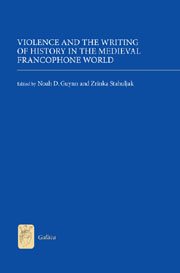Book contents
- Frontmatter
- Contents
- List of Illustrations
- List of Contributors
- Acknowledgments
- Introduction
- 1 Historicity, Violence, and the Medieval Francophone World: Mémoire Hystérisée
- Part I Theorizing Violence
- Part II Institutions and Subversions
- Part III Gender and Sexuality
- 8 Political Violence and Sexual Violation in the Work of Benoît de Sainte-Maure
- 9 The Sexuality of History: The Demise of Hugh Despenser, Roger Mortimer, and Richard II in Jean Le Bel, Jean Froissart, and Jean d'Outremeuse
- Part IV Trauma, Memory, and Healing
- Index
- Already Published
9 - The Sexuality of History: The Demise of Hugh Despenser, Roger Mortimer, and Richard II in Jean Le Bel, Jean Froissart, and Jean d'Outremeuse
from Part III - Gender and Sexuality
Published online by Cambridge University Press: 05 April 2013
- Frontmatter
- Contents
- List of Illustrations
- List of Contributors
- Acknowledgments
- Introduction
- 1 Historicity, Violence, and the Medieval Francophone World: Mémoire Hystérisée
- Part I Theorizing Violence
- Part II Institutions and Subversions
- Part III Gender and Sexuality
- 8 Political Violence and Sexual Violation in the Work of Benoît de Sainte-Maure
- 9 The Sexuality of History: The Demise of Hugh Despenser, Roger Mortimer, and Richard II in Jean Le Bel, Jean Froissart, and Jean d'Outremeuse
- Part IV Trauma, Memory, and Healing
- Index
- Already Published
Summary
The francophone chroniclers Jean Le Bel, Jean Froissart, and Jean d'Outremeuse characterize the Franco-English Hundred Years War (1337– 1453) as senseless destruction, “morteile guere” [deadly war], “grandes guerres et dissolutions” [great war and annihilation], “grans destructions de gens et de pays” [great destruction of people and lands], and “grant desolation” [great devastation]. Philippe de Mézières describes it as “une plaie … universelle” [a wound … universally spread]. They begin their histories of this particularly devastating and bloody war with the events that brought Edward III to the throne. They report that, acting upon the counsel of Hugh Despenser the Younger, Edward II forced his wife, Queen Isabella, to flee to France with their son in May 1325, accompanied by Sir Roger Mortimer and the Earl of Kent. In reality, Edward II sent Isabella to her homeland, France, to negotiate the terms of Edward II's homage for Gascony with her brother, Charles IV of France; and their son, the future Edward III, later joined her there. Isabella, having been persecuted at court by Hugh Despenser, returned to England only in September 1326, accompanied by the knights of Hainault, which brought about the overthrow of Edward II, the execution of his counselor and lover Hugh Despenser the Younger, and the crowning of Edward III, the war-loving king of the English whose challenge to the French throne led to the outbreak of the Hundred Years War in 1337.
- Type
- Chapter
- Information
- Publisher: Boydell & BrewerPrint publication year: 2013



